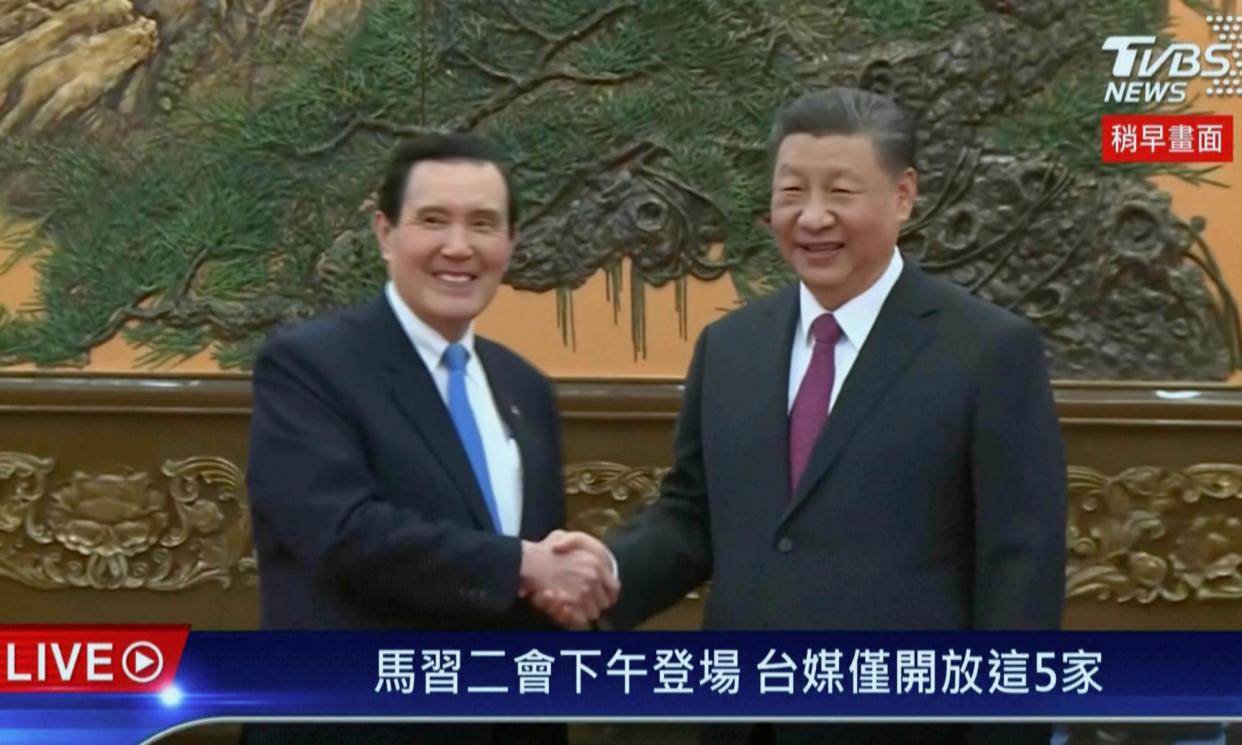China and Taiwan are destined for ‘reunification’, Xi tells former president

Xi Jinping has met the former Taiwan president Ma Ying-jeou, in what analysts said was an attempt to promote peaceful unification as the only alternative to military annexation of Taiwan.
Ma, who was leading a student delegation to China, met Xi in Beijing at the Great Hall of the People, a venue typically reserved for foreign leaders meeting with senior Chinese officials. Xi used the meeting to emphasise his belief that Taiwan and China were destined for what he terms “reunification”.
“External interference cannot stop the historical trend of reunion of the country and family,” Xi said, according to Taiwanese media. He said that people on both sides of the Taiwan strait were Chinese, and “there is no rancour that cannot be resolved, no problem that cannot be discussed, and no force that can separate us”.
According to local reports, Ma said that a war between the two sides would be “an unbearable burden for the Chinese nation”.
“The Chinese people on both sides of the Taiwan Strait will definitely have enough wisdom to handle cross-strait disputes peacefully and avoid conflicts,” Ma said.
Xi claims Taiwan as a province of China and has sworn to annex it, by force if necessary. In the interim he has presided over a wide-scale campaign of political, economic and cognitive warfare, and near-daily military intimidation, in order to persuade Taiwan to accept Chinese rule.
However a growing majority of Taiwan’s people and its government reject the prospect. The Kuomintang (KMT) opposition party, of which Ma remains a senior member, also rejects reunification but advocates for closer ties with China as the way to preserve peace. Ma is one of the party’s most China-friendly figures.
Amanda Hsiao, a senior China analyst with the International Crisis Group, said Beijing was trying to put on a friendlier face but also probably trying to undermine the ruling party and incoming government, just weeks out from the presidential inauguration of Lai Ching-te, whom Beijing despises. At the same time it was attempting to give the KMT “more material to say that only they can lower cross-strait tensions”.
“While parts of the messages conveyed during the meeting will appeal, other aspects [like] that the two sides are parts of a great Chinese nation will likely have limited appeal to a larger society which increasing identifies as distinctly Taiwanese,” Hsiao said.
Ma left office eight years ago but still holds some social and political influence, and has remained a visible public figure. On Wednesday, Xi praised Ma’s promotion of cross-strait exchanges and opposition to Taiwanese independence.
Wen-Ti Sung, a political expert at the Australian National University, said Ma was probably trying to preserve his legacy of warmer ties with China. Sung said Beijing’s “continued fixation” on Ma could suggest an inability to cultivate other senior political figures in Taiwan who were “willing to play dove towards Beijing today”.
However, Beijing was also likely to be using the visit to signal that peaceful unification through “winning over hearts and minds” remained Beijing’s preferred option, he said.
Wednesday’s meeting had been rumoured but was not confirmed until shortly before. It was the second for Xi and Ma, after a landmark summit in Singapore in 2015, while Ma was still president. No current leader of Taiwan has visited China since the end of the civil war in 1949.
Additional reporting by Chi Hui Lin


